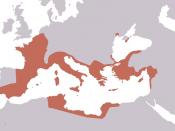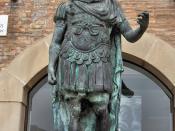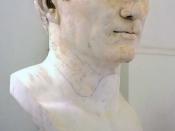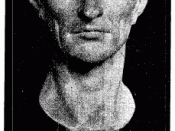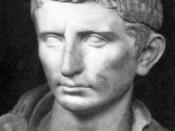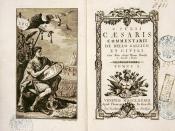Mark Anthony won the citizens trust, He cast doubt He incited action. Well he is a very wise man who completes his plan as he had planned it which his plan was to turn the citizens agianst Brutus and the conspirators.
Mark Anthony won the citizens trust and the way he did it was very smart.
When he got by the citizens he said "Friends , country men, citizens...I come to bury Caesar, not to praise him" now what he says, actually means to turn the citizens of Rome against Brutus and the conspirators, revenging Julius Caesar's death. Mark Anthony continues his speech by using the idea from Brutus' speech that Julius Caesar was an ambitious man. Brutus used this thought to support his stabing of Julius Caesar. Anthony does not dispute Brutus' respectable reputation, instead he says "For Brutus is an honorable man" and thats where the irony of Anthony's speech comes where he is against Brutus but he says he is a honorable man.
The way Mark Anthony casted doubt was very wise also. However, Anthony does begin to disagree with Brutus' comment on Julius Caesar's grievous ambition.
Anthony does this by appealing to the audience's logic, and presents two strong examples of Caesar's lack of ambition. He says "He hath brought many captives home to Rome, Whose ransoms did the general coffers fill; Did this in Julius Caesar seem ambitious?". Anthony also involves the crowd in his speech, asking them a question and forcing them to ponder whether the assassination of Julius Caesar was nothing but a disservice to the Roman Empire. Mark Anthony continues to dispute Caesar's ambitiosness, however still maintaining that the conspirator's were honorable men. He says "Brutus is an honorable man". But he continually repeats this line, even after he has just disproved Julius Caesar's ambition, making the compliment sound sarcastic and mocking. By proving to the audience that Caesar was not full of ambition, he also proves that the conspirators were not honorable men, thus concluding that Julius Caesar's death was a futile murder, devastating to the welfare of Rome.
Mark Anthony uses parison, repeating the same idea continually, only rephrasing it slightly each time. He explains to the crowd "Yet Brutus says he was ambitious, And sure he is an honorable man". By incessantly reiterating this idea, it becomes gradually engraved in the crowd's mind. Again, Mark Anthony says " But Brutus says he was ambitious, And Brutus is an honorable man". Only somewhat rearticulated, Mark Anthony again compels the same idea, gradually obtaining reservation from the crowd towards Brutus. To further gain favour from the crowd, Mark Anthony appeals to the emotions of his audience, pausing dramatically to say ""æBear with me, My heart is in the coffin there with Julius Caesar, And I must pause till itcome back to me." Mark Anthony's speech calls for a dramatic pause, where he stops to "ÃÂregain his heart.' This line, however, is no more than a strategic and shrewdly placed break, where Mark Anthony forces the crowd to decide if they are truly persuaded by his speech or not. By Mark Antony bringing Julius Caesar's body and making the citizens of Rome create a circle around Mark Antony and Julius Caesar's body he shows them the stabing wounds and that is a very big thing and it gets the citizens to think of violent ideas and so they do and they go and try to find Brutus and the conspirators, so they can kill them and burn there houses down.
Mark Anthony's speech successfully incorporates a host of persuasive language devices, most important of them being parison, sarcasm and irony. The great skill of rhetoric and oration Mark Anthony displays triumphs in the seemingly impossible task of winning the audience.
